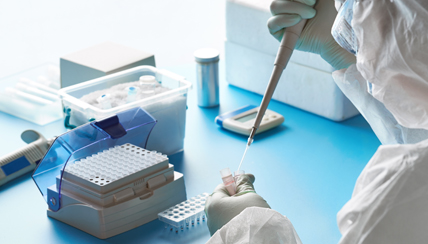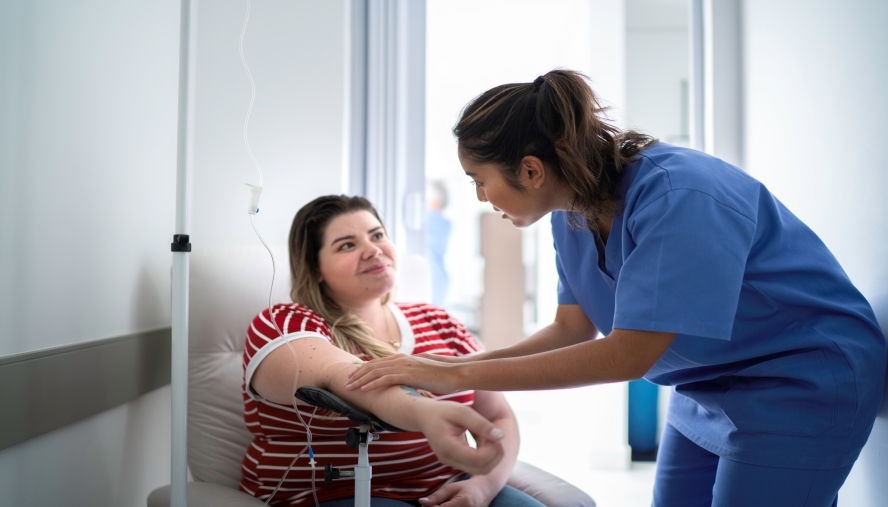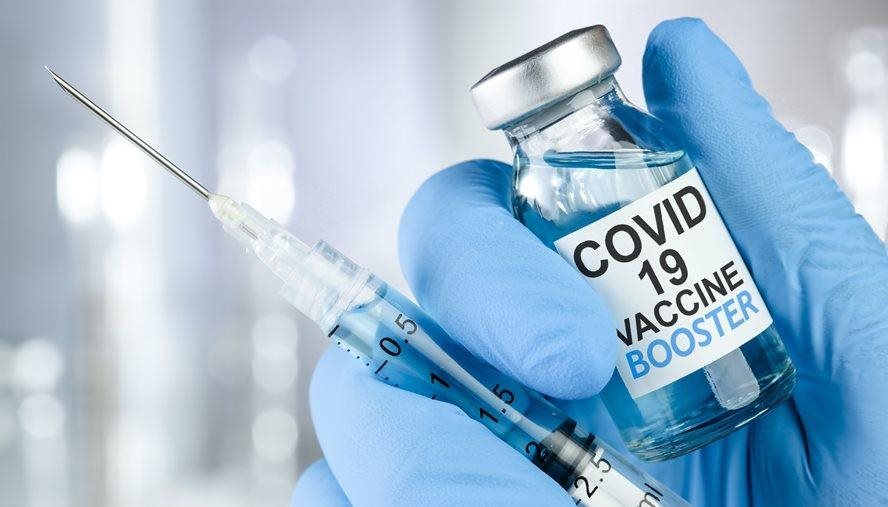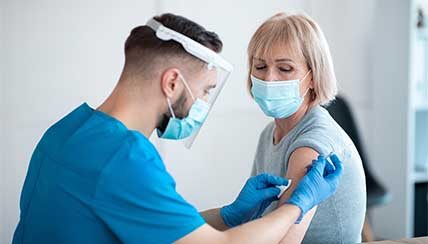National Jewish Health COVID-19 Research
COVID-19 Basic, Translational and Clinical Research
 Almost as soon as the pandemic began, researchers at National Jewish Health launched projects to understand the virus, the disease it causes, our immune response to it and medications to treat the disease. The breadth and variety of the research projects has been truly impressive.
Almost as soon as the pandemic began, researchers at National Jewish Health launched projects to understand the virus, the disease it causes, our immune response to it and medications to treat the disease. The breadth and variety of the research projects has been truly impressive.
ANTIVIRAL LIPIDS
Mari Numata-Nakamura, MD, PhD, and Dennis Voelker, PhD, have shown that the lipids POPG and PI, which occur naturally in the lungs, inhibit SARS-CoV-2 replication in airway cells by 70% to 85%. They continue to investigate POPG and PI as potential therapies to treat and prevent COVID-19.
ARDS
Kara Mould, MD, received a Boettcher Foundation COVID-19 Research Grant. Dr. Mould will leverage a non-bronchoscopic lavage technique to collect samples from patients with COVID-19 acute respiratory distress syndrome (ARDS), as well as those with non-COVID ARDS, in order to construct a time course of inflammatory responses. She will then correlate them with presence of leukocytes and inflammatory mediators in the circulating blood. This study will provide the first-ever, time-resolved assessment of inflammatory responses in COVID-19 and non-COVID ARDS. James Crapo, MD, and colleagues received a Boettcher Foundation COVID-19 Research Grant to investigate the effects of the novel drug, BMX-001 to determine if it could be a new therapy to reduce pulmonary injury, morbidity, and mortality from COVID-19 and other viruses that cause virus-associated acute respiratory distress syndrome.
ASTHMA
Michael Wechsler, MD, and his colleagues reported that asthma appears not to be a risk factor for severe COVID-19, contrary to initial expectations, with hospitalizations and intubations of asthma patients comparable to population prevalence of the disease. Dr. Max Seibold is adapting an ongoing study of respiratory infections in asthma to investigations examining the role of the ACE2 receptor that binds SARS-CoV-2 and patients’ responses to other coronaviruses, which cause milder disease similar to the common cold.
Clinical Trials
National Jewish Health has participated in nine clinical trials of experimental therapies against COVID-19, including remdesivir, hydroxychloroquine and monoclonal antibodies. Ongoing clinical trials include one therapy designed to prevent scarring of the lungs that occurs in many COVID-19 patients.
CHILDREN
In addition to providing care through our Pediatric Center for Post-COVID Care and Recovery, Max Seibold, PhD, and his colleagues are analyzing COVID-19 tests from 2,000 children and their family members to learn how often children become infected and if they spread the disease to others.
COPD
Elizabeth Regan, MD, PhD, and Barry Make, MD, have received a grant to participate in the national study known as Cohort of Cohorts to evaluate risk, resilience and outcomes for COVID-19 among people enrolled in numerous existing NIH studies. Drs. Regan and Make will prospectively follow thousands of COPD patients enrolled in the COPDGene study. Evaluations will include post-COVID symptoms and outcomes, as well as assessment of the social and behavioral impact of the pandemic on long-term trajectories of health and aging.
CYTOKINE STORM
William Janssen, MD, and Kara Mould, MD, are investigating cell types active in the lungs of acutely ill COVID-19 patients to understand the hyperinflammatory “cytokine storm” that overwhelms some severely ill patients. They have identified the NLRP3 gene as a potential target to prevent reduce organ damage.
GENETICS
Researcher Max Seibold, PhD, and his colleagues have also reported results of genetic studies evaluating the potential risk that asthma patients face of SARS-CoV-2 infections and severe COVID-19. They looked at expression patterns of ACE2 and TMPRSS2 genes, which are involved in SARS-CoV-2 entry into cells. High expression of those genes suggests higher risk. Overall, there appeared to be no difference between healthy patients and those with asthma in the expression of these genes. Among asthma patients, however, African Americans, males and those with diabetes showed higher expression of the ACE2 and TMPRSS2 genes. Those taking inhaled corticosteroids had lower expression of those genes. Read the abstract.
SERUM
Drs. Jeff Kern, Bill Janssen, Jay Finigan, Tasha Fingerlin, Reeti Khare, Ron Harbeck, and others are participating in clinical research studies of novel drug treatments and the utility of blood serum from convalescent COVID-19 patients in treatment of the most critically ill of the SARS CoV2-infected patients. National Jewish Health is also participating in a consortium that includes SCL Health, the University of Colorado Anschutz, and the Colorado State University to test and use purified anti-SARS-CoV2 antibodies isolated from convalescent serum to treat patients with severe COVID-19 disease.
SEVERE COVID
Bill Janssen, MD, head of our critical care section, has also secured NIH funding to better understand how some COVID-19 patients develop severe disease. He is identifying various cell types active in the lungs of acutely ill patients and seeking to understand the inflammatory cascade in people with varying severity of disease. Robert Mason, MD, describes course of a SARS-CoV-2 infection from the perspective of a cell biologist in the European Respiratory Journal. Infections limited to the upper airways are likely to be mild. When the infection spreads to cells in the alveoli, deep in the lung, severe disease is likely to occur. Full paper available.
UPPER AIRWAYS
National Jewish Health pulmonologist and researcher Robert Mason, MD, describes course of a SARS-CoV-2 infection from the perspective of a cell biologist in the European Respiratory Journal. Infections limited to the upper airways are likely to be mild. When the infection spreads to cells in the alveoli, deep in the lung, severe disease is likely to occur. Full paper available.
VAPING
A research team of Drs. Mike Wechsler, Russ Bowler, Barry Make and Hong Wei Chu are planning studies of the virus’s effects on asthma and COPD as well as on the youth who are vaping, and in patients who have Acute Respiratory Distress Syndrome. Irina Petrache, MD, has received a grant from the American Lung Association to extend preliminary research that suggests vaping and influenza infections may make COVID-19 infection more likely and more serious.
VARIANTS
Michael Strong, PhD, and his laboratory staff have monitored the emergence of SARSCoV-2 variants around the world, and found an increasing prevalence of mutations to the coronavirus spike protein, which could affect transmissibility and vaccine effectiveness. Gongyi Zhang, PhD; Haolin Liu, PhD; and their colleagues discovered that the B.1.1.7 variant, also known as the UK variant, is more contagious because its binds 10 times more strongly to the ACE2 receptor it uses to enter cells. The Infectious Disease laboratory has developed a PCR-based method to detect variants more quickly and less expensively than can be done with genetic sequencing to guide efforts to prevent disease transmission and develop effective vaccines. Ed Chan, MD, and colleagues identified two novel mutations in the SARS-CoV-2 spike protein that may affect pathogenicity of the coronavirus and viability of vaccines against it.
The information on our website is medically reviewed and accurate at the time of publication. Due to the changing nature of the COVID-19 pandemic, information may have since changed. CDC.gov and your state’s health department may offer additional guidance. |



